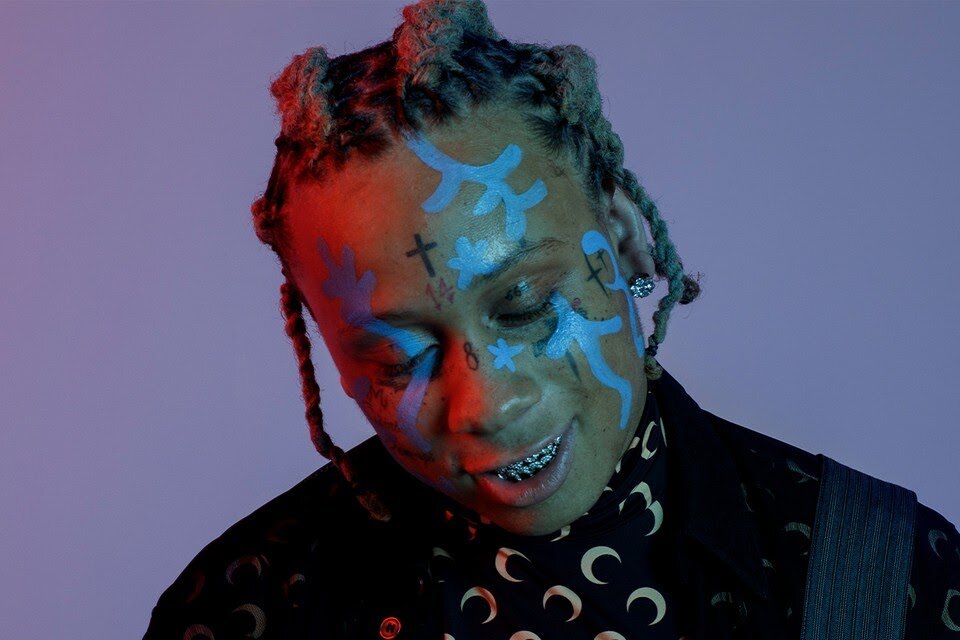Album Review: Trippie Redd’s Mystical Ride on ‘Pegasus’ Isn’t Smooth Sailing
The marathon listen of Pegasus is a turbulent, but familiar trek for Trippie Redd fans.
Written by Thomas Galindo
Photo courtesy of HYPEBEAST
Canton, Ohio native Trippie Redd seems to always be putting out new projects. Since the start of 2017, the 21 year old has released seven albums/mixtapes. For some context: since Kendrick Lamar dropped his most recent album, DAMN., Trippie has created his entire career with the catalog of a long-tenured artist. As a pioneer for the emo rap landscape popularized by Juice WRLD and Lil Uzi Vert, Trippie has at times sacrificed quality in his music for quantity to achieve commercial success.
This is not to say he isn’t a talented musician. In fact, a number of Trippie’s projects are enjoyable, fun, and arguably innovative in helping push emo rap into the mainstream. Projects such as Life’s A Trip (2018), and nearly all of the content on the A Love Letter to You four-part series include exceptional examples of moody, crooning bops and heartbreak ballads. But, low moments of his career such as ! in 2019 make it feel like Trippie is running out of ideas. After a relatively long hiatus for his standards — 11 months of no new projects — Trippie released Pegasus, his third official studio album, on Oct. 30.
Image courtesy of TenThousand Projects
Pegasus is a 26-song, 74-minute-long album, featuring prominent hip-hop figures such as Busta Rhymes, Quavo, Future, Young Thug, Lil Wayne, and Swae Lee. Inspired by the Greek mythological hero Perseus, Clash of the Titans, and his adolescent reading of Rick Riordan’s “Percy Jackson” series, Trippie explained in an interview with Lyrical Lemonade, “The direction on the album is supposed to feel mystical. Like dreamy, nostalgic, outer space.” The album opens with four songs that follow this vibe — songs such as “Moonlight” and “Love Scars 4” have a mellow rhythm and trap drums that are not unfamiliar territory for Trippie. Songs like these allow Trippie to display his catchy vocal harmonies.
The rest of the album is basically a mixed bag that, at times, tends to deviate from the message of the album Trippie aimed to portray. Songs like “Excitement,” a collab with PARTYNEXTDOOR, “Spaceships” featuring Young Thug, as well as “Good Morning,” and “Hell Rain” featuring Lil Wayne and Hoodbaby play to Trippie’s aforementioned strengths. However, several moments on the tracklist cross the fine line of a melodic, laid-back groove like the flat out boring, uninspired songs “The Nether,” “Take One,” “Don,” and the closing song, “Sun God.” Another trend that Trippie tends to follow on his projects is disrupting the dreamy vibe with a hard-hitting banger for a song or two. The difference on Pegasus, however, is that these bangers come at a higher volume than before, but with less firepower.
On his previous albums, songs like “Death” featuring DaBaby, “1400/999 Freestyle” featuring Juice WRLD, and “Mac 10” featuring Lil Baby and Lil Duke were a nice change of pace — all thoroughly enjoyable. Pegasus features a multitude of attempts at this same effect: “Never Change” featuring Future, “No Honorable Mention” featuring Quavo and Lil Mosey, “Red Beam” featuring Sean Kingston, “Sleepy Hollow,” and “Kid the Didd” featuring Future and Doe Boy. On the better end of these is “Sleepy Hollow,” one of the singles released about three weeks before the album’s drop, and “Never Change.” But, these still do not reach the caliber of a traditional Trippie banger like “Dark Knight Dummo” featuring Travis Scott from the album Life’s a Trip. On the lesser end of these ‘banger’ type songs is “Red Beam” and “No Honorable Mention,” which aren’t terrible, but have no discernable, likeable performances by Trippie or any of his features, with the possible exception of Quavo.
Overall, Pegasus only adds to a chronicle of Trippie having trouble breaking through mediocrity into some form of consistent quality. The album is just too long, and even the strongest performances aren’t strong enough to keep the listener engaged for an hour and 14 minutes. The features on this album certainly help, because if this entire project was Trippie crooning for over an hour, it probably wouldn’t even be listenable. Both of Future’s features are quality, up-to-Future standard assists, and PARTYNEXTDOOR and Young Thug come through with sweet-sounding verses to uplift songs that are already highlights on the record. Trippie just needs to learn how to trim down his records in length and direct his energy into tracks that are more memorable. The talent is there, and he knows what sounds he thrives with, but the execution could be better. Even with several great songs and a handful of decent records in his long catalog of projects, Trippie Redd is still a young artist. Pegasus did not seem to achieve what it set out to, and thus, the album should be seen as an opportunity to learn and grow, rather than a milestone in Trippie’s early career.


